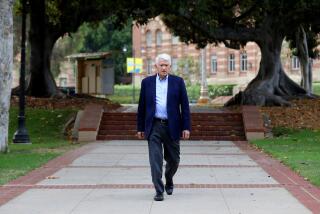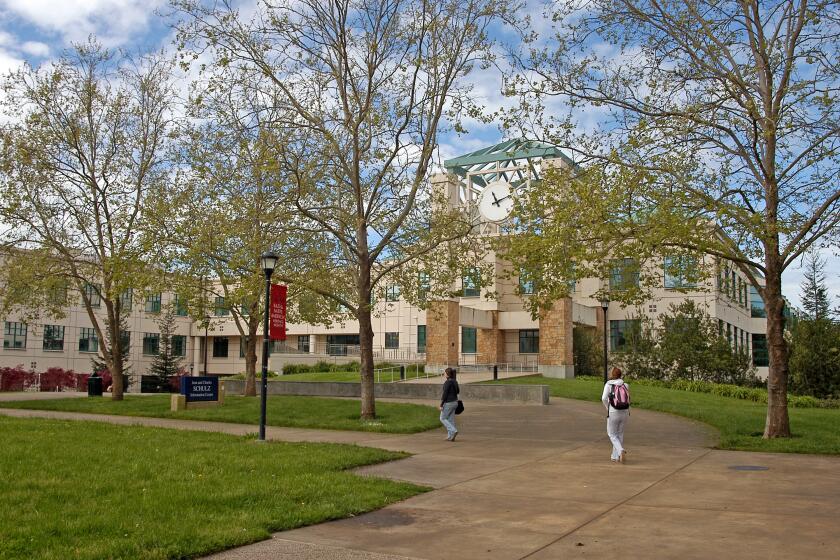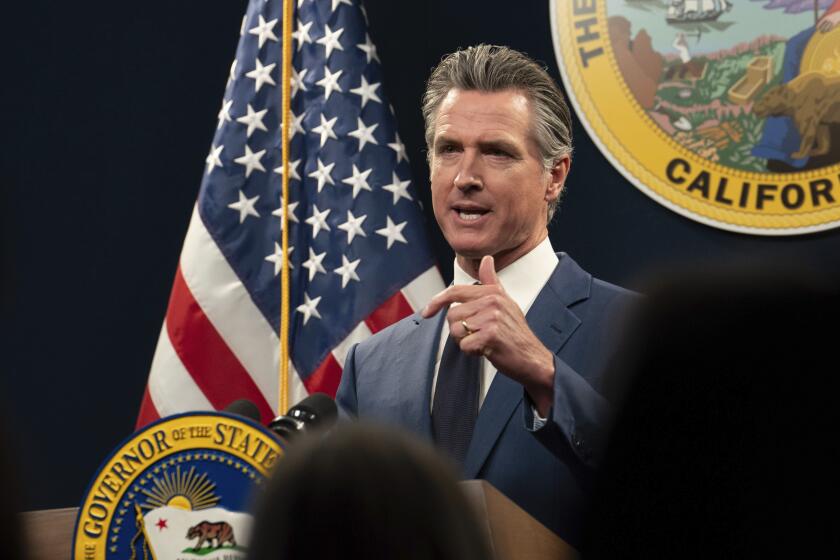LOCAL ELECTIONS / BOARD OF SUPERVISORS : Reform Laws Changing Way Candidates Run Campaigns
In the first significant test of Orange County’s sweeping campaign reforms, supervisorial candidates in the hotly contested race for the 2nd District seat have been forced to campaign with less money than candidates in previous board elections, campaign finance records show.
Both supporters and critics of the campaign reform laws say the contribution limits have had a dramatic impact on the way candidates Linda Moulton Patterson and Jim Silva have campaigned so far.
Supporters contend that the reforms have caused the candidates to focus more on public debates and community forums to reach voters, instead of relying on expensive mailers.
“This is how campaigns should be run,” said William R. Mitchell, chairman of Orange County Common Cause, a political watchdog group. “I’m very pleased with the way the reforms are working.”
But campaign consultants for the two 2nd District candidates say the contribution restrictions, which limit individual donations to $1,000 per candidate for every election cycle, have resulted in the candidates spending more time trying to raise money and less time meeting with the public.
“It’s nothing like it was last time there was a heavily contested supervisorial race eight years ago,” said Harvey Englander, campaign manager for Moulton Patterson. “There was a lot more spending then. Now it’s harder to get our message across.”
“The price of running a campaign has gone up and the number of voters keeps going up with the population growth,” said Dave Gilliard, who is running Silva’s campaign. “The restrictions have definitely made it tougher to run a campaign.”
Because of the reforms, the candidates have had to seek “free media” coverage, such as newspaper articles, while stockpiling cash for last-minute election mailers to reach the voters, the consultants said.
Despite the contribution limitation, both candidates in the bitter race have still been able to amass significant war chests. According to campaign officials, Moulton Patterson, the mayor of Huntington Beach, has raised $268,000 for the primary and general election races; Silva, a Huntington Beach councilman, has raised $260,000.
Those figures, however, are less than what candidates raised in 1986, the last time there was an open Orange County supervisorial seat. The two top candidates in that race spent a combined total of more than $1 million, records show.
In that election, then-Anaheim Mayor Don R. Roth faced off against then-Orange Mayor James Beam and former Rep. Jerry Patterson, who is Moulton Patterson’s husband. A fourth candidate, Manuel Mendez, rounded out the highly competitive field. Spending in that race totaled more than $1.6 million. In a runoff, Roth--who spent about $430,000--beat Beam, who spent more than $640,000.
“Neither side will be able to do that this time,” said Englander, who ran Roth’s 1986 campaign. He added that the top candidates in 1986 sent out eight to 12 mailers in that race. To date, Silva has sent five mailers and Moulton Patterson three mailers.
The 2nd District includes Huntington Beach, Seal Beach, Westminster, Los Alamitos, Garden Grove, Stanton, Cypress, Rossmoor and Sunset Beach.
“There are approximately 244,000 voters in this district,” Englander said. “To mail one piece of mail is $18,000 and that’s just the postage. With the printing and materials it costs $40,000 to mail something now. That’s a lot of money. I don’t think we’ll be able to reach as many voters as we did eight years ago.”
He added: “We spend almost every business hour raising money today and less time meeting voters.”
Supporters of the campaign reforms, however, were not sympathetic to the complaints of the political consultants.
“It’s really tough for both sides. So what?” said Supervisor Roger R. Stanton. “It’s probably equal. So the campaign consultants won’t be getting as much money as they used to. Let’s hear the applause for that.”
Supporters say that even if the candidates are spending more time trying to raise money, they are doing it by contacting more contributors instead of relying on a few wealthy special interest groups, which the backers say was a major reason why the reforms were needed.
“I’d rather see them getting money from more people than having the developers fund the campaign,” said Shirley Grindle, a political activist who helped author the 1992 reform laws. “That’s one of the goals of the ordinance--to spread things around.”
Many developers and other special interest groups still contribute up to the $1,000 limit for primary races and then for the general election. Both Silva and Moulton Patterson report contributions from developers such as the Mission Viejo Co. and the Irvine Co.
But the role of developers and special interests groups in financing campaigns has definitely been limited by the reform measures. As a result, Silva and Moulton Patterson have had to look to many sources for funds.
“I think they’re having a heck of a time raising money. There’s so much competition for the political dollars,” said Supervisor William G. Steiner. “I think everybody is having a hard time. (The reforms) are making the race a much more grass-roots effort.”
Even some lobbyists have welcomed the contribution restrictions.
“It gives my clients a chance to spread their money around on a broader basis,” said Frank Michelena, a top governmental consultant in the county. “With cities, the state and the county, it’s just impossible to contribute to everyone. So far we’ve been able to live with this.”
Grindle said the two candidates may be collecting less money for their campaigns because private citizens and businesses are feeling the pinch of the state’s recession.
“We’re testing the creativeness of the political consultants,” Grindle said. “They don’t have an open bankbook anymore.”
Former Supervisor Ralph Clark said he thinks the reform laws are healthy for politics and believes further measures should be taken.
“I think they should also put a lid on how much money a person can put into their own campaign,” he said, referring to Haydee V. Tillotson, who lent her own campaign for the 2nd District $342,000. Despite her financial resources, she lost to Silva and Moulton Patterson in the primary.
But even Clark said he realizes that the expense of running a campaign has changed over the years. “When I ran, stamps cost 5 cents and mailers were cheaper,” he said. “Everything is on a different scale now.”
More to Read
Start your day right
Sign up for Essential California for news, features and recommendations from the L.A. Times and beyond in your inbox six days a week.
You may occasionally receive promotional content from the Los Angeles Times.






